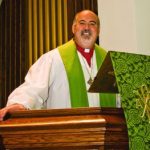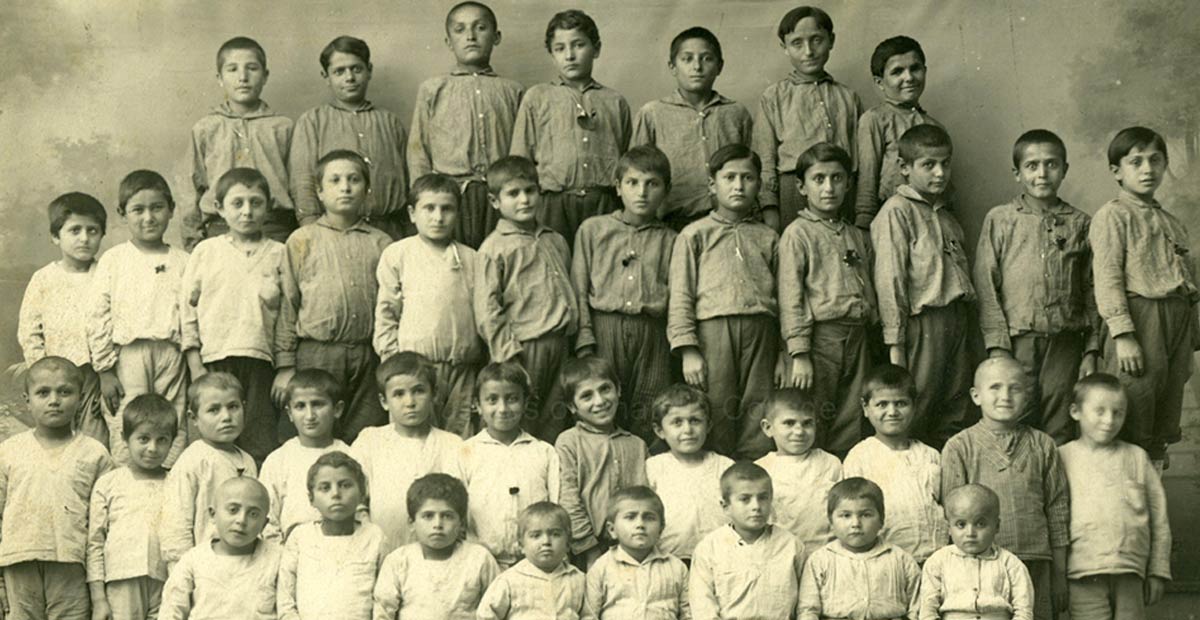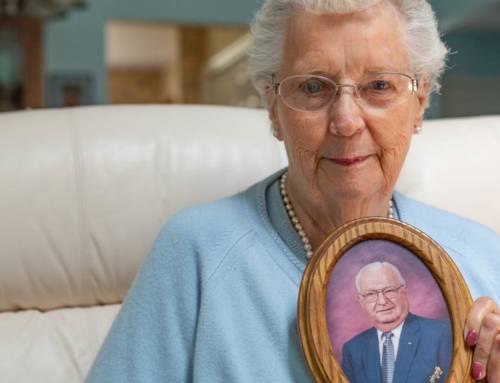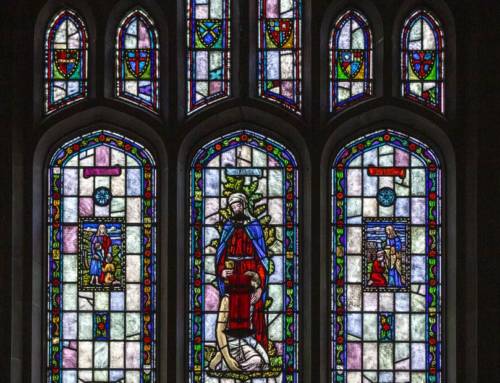
About the Author: Sunday Sermons from Sell Chapel are written by Rev. Preston Van Deursen, Director of Pastoral Care at the Masonic Village at Elizabethtown.
As I was doing some reading for my sermon last week I came across something I did not know about. In the early 1900’s there was such a thing as an Orphan Train across America. I was reading about Alice Marion Ham whose story interested me because she as I knew little about her origins. She only knew that police found her and her brother, Robert, who was only a toddler at the time, abandoned on a New York City street in 1926. The two children were subsequently bundled by orphanage workers onto a train that carried them from the city to a new life in the rural Midwest. Alice wound up moving from one abusive home to another, while Robert was taken in by a family that treated him like royalty. Alice and several other riders of New York’s so-called Orphan Trains got together recently to share memories of being orphaned or abandoned in New York and being sent off to new families in the Midwest. They said the reunion helped them build a sense of identity and common heritage.
The Orphan Train movement ran from 1854 until 1929, relocating an estimated 150,000 children from New York at a time when poverty and that city’s booming immigrant population resulted in overcrowding, disease and death. The aim of the Orphan Trains was to take orphans to wholesome farming families who could offer loving homes, although that did not always happen. Some of the children were paired with families by lottery, and some were lined up at stations so prospective parents could inspect them before making a choice. Siblings often were split up.
“There was so much hurt and pain of being separated from your family,” said 77-year-old Alice Bullis Ayler of Oklahoma City. “The main thing they told us was not to talk about it. There was such a stigma on orphans.” Ms. Ayler remembers riding in a Pullman car from New York to Kansas, where she was made to operate a windmill at age 10. Babies typically fared better than the older children, she said. “They didn’t have anything else, no social welfare program, no food stamps,” Ms. Ayler said.” There was no chance if you were left in New York.”
June Long of Colonial Beach, Va., got tears in her eyes explaining that her father was dropped off at the New York Foundling Home when he was an infant. He was placed with a family in Minnesota but was later traded for a field of corn. Ms. Long said her father, who died in 1970, always refused to discuss his childhood. But she found the reunion gratifying. “Other people had bad problems like my dad,” she said. “He wasn’t alone.”
In the current rush to reduce the size of our government and to remove it from the business of looking after the least and the lowest in our society, we need to remember episodes in our history like that of the Orphan Train movement.
However, that is not the point of today’s message. Rather, I want to suggest to you today that THERE ARE MANY PEOPLE who are STILL RIDING THE ORPHAN TRAIN.
Listen again to the words of St. Paul as he writes: “All who are led by the Spirit of God are children of God. For you did not receive a spirit of slavery to fall back into fear, but you have received a spirit of adoption. When we cry, Abba! Father!’ it is that very Spirit bearing witness with our spirit that we are children of God and joint heirs with Christ ” if, in fact we suffer with him so that we may also be glorified with him.”
You know MANY OF US ARE LIVING LIKE ORPHANS WHEN WE ARE IN FACT CHILDREN OF GOD. How do I know? I go back to last weeks sermon…BECAUSE MANY OF US ARE STILL DOMINATED BY OUR FEARS RATHER THAN OUR FAITH. When you know yourself to be a child of God, fear vanishes. “For you did not receive a spirit of slavery to fall back into fear, but you have received a spirit of adoption. . . .”
OUR LESSON IS SAYING TO US, FIRST OF ALL, THAT FEAR IS THE HANDMAIDEN OF DOUBT. When we doubt God’s goodness we become afraid. We quit trusting the universe. We become fearful of the future. We lose confidence in ourselves and our ability to influence our own destinies. We lose confidence in others and their intentions and motivations. In other words, we live by fear rather than faith, and the cost is terrible.
I talked about those words of Franklin Delano Roosevelt who inspired us “The only thing we have to fear is fear itself.” Words like those lifted our nation’s spirit when it had been frayed by depression and war. According to Robert Conklin in his book Think Yourself to the Riches of Life, however, what could have been Roosevelt’s greatest oration was never delivered. It was to be a Jefferson Day address on April 13, 1945. President Roosevelt had recently returned from Yalta and a conference with Stalin and Churchill. Plans were already in place that would make for an Allied victory to end the Second World War. An international gathering was scheduled in San Francisco to draw up the charter for the United Nations. Wednesday evening, April 11, Roosevelt finalized his draft of the Jefferson Day address. The next day, the president was going over some official papers when he slumped forward, unconscious, at his desk. The rich, melodic voice was silenced forever. If he had lived to speak the next day, the nation would have heard him say that doubts and fears must be conquered, the science of human relationships must be cultivated, and hope must be preserved for a peaceful, happier life for all people throughout the world. These would have been his closing words: “The only limit to our realization of tomorrow will be our doubts of today.” (2) And that is true. “The only limits to our realization of tomorrow ARE our doubts of today.” Some of us can look back over a lifetime of unfulfilled dreams and the only villains are our own doubts and fears ” our own uncertainty about who we are and why we are here.
there is a book Baby Steps to Happiness, tells about a friend of his who described himself as dyslexic. In fact, he did suffer from dyslexia and had severe letter and word reversal problems. This unfortunate malady had followed him into adulthood. He had accommodated his learning style, however, gone on with his life, and achieved a measure of success despite his difficulties. But he still suffered emotional damage from this disability. Finally, when he was discussing this with Baucom, Baucom suggested he quit referring to himself as a dyslexic. “You are not a dyslexic,” Baucom told him. “That’s just the way you learn. You are you. Dyslexia is the way you learn. They are two different things.” There were a few moments of emotion-filled silence. Finally his friend asked Baucom to say it again. Baucom repeated the comment five separate times. He was not dyslexic. He was simply a person who suffered from dyslexia. Five times this was repeated before his friend finally burst out crying. “I’ve always thought of myself as defective,” he exclaimed. “I’ve thought of myself as a dyslexic. I never thought I was a person who simply learned in a dyslexic style. I thought I WAS dyslexic.”
Here was a man who was being held back – not by his problem but how he felt about the problem. He had labeled himself as inadequate, unfit, unworthy and had suffered greatly as a result even though he had accomplished much. The only real limitation was how he felt about himself. He had given in to his fears rather than his faith. May I suggest that this is the biggest barrier many of us have to overcome. The handmaiden of doubt is fear. And fear does terrible things to us. Fear limits our tomorrows and burdens our todays. The quality of our lives is lessened when our hearts are filled with fear. When we are dominated by our fears we add the burdens of worry and stress to the other heavy responsibilities that we carry each day.
MODERN MEDIA, OF COURSE, CATER TO OUR FEARS. Some of you can remember the monster movies of the 1950s. The theme of these movies was that science had run amok and was creating giant women, ants, spiders, lizards, praying mantises, and the like. Some of us recall the fluoride hysteria that began about half a century ago when towns began fluoridating their water supply. In one such town, the local health office received citizen complaints that fluoridated water was discoloring their saucepans, that it was giving them digestive troubles. One woman complained that the “fluoride water” had caused her dentures to crack. All of these complaints came in before the city actually began to fluoridate. (4)
Today there are new fears. Futurists Faith Popcorn and Lys Marigold in their new book Clicking have come up with this list of “Things to Worry About Now (That You Never Had to Worry About Before)”:
- Innocently opening a package in your home ” boom.
- Developing a brain tumor from your cellular phone.
- That flesh-eating strep-A bacteria.
- Radioactive waste in space, orbiting the Earth.
- Airborne tuberculosis or meningitis in an airplane . . .
- On-line stalking: pedophiles, con artists.
And the list goes on and on. We live in a climate of unreasonable fear. This is not to hide our heads in the sand and declare that there is nothing to fear in our modern world. It is to say that the world is probably safer than it has ever been. There have always been problems. What has changed is the number of possible disasters we have created in our own minds. THERE WILL ALWAYS BE DANGER IN THE WORLD. BUT ONE OTHER THING WILL ALSO ALWAYS BE TRUE – WE DO NOT FACE THE WORLD ALONE. WE HAVE A FRIEND.
A woman by the name of Darryl Potter, who lives outside of Toronto, wrote a book about her life titled God’s Wonderful Gift to Me. One day at the office, Darryl hit her knee against a file cabinet, which resulted in blood clots that, in turn, devastated her body. She underwent over one hundred operations. She lost one leg at the hip, and the other leg above the knee. Her right arm also eventually had to be amputated and she lost her sight in one eye.
All the surgery and pain she endured led to an addiction to pain pills. In the meantime, her husband was so traumatized by these events that he began to drink and abuse the children. That situation resulted in Darryl having to divorce him. Her own children then went to live with her mother. You would think, well, her life is over.
It was at this point in her life that Darryl says she heard the Lord say to her, “Why are you afraid?” That was the turning point. Just that simple question, which isn’t at all simple, turned her around. It led her to take stock of her life, and it changed her. Just that simple question, “Why are you afraid?” She began to get herself moving, to set aside self-pity, and get her life back on track. She then began, and continues to this day, to travel across Canada speaking to people about helping the handicapped. Darryl wrote these words: “It is not my missing limbs that matter now, but what is within me that counts. God has an image, a picture of me, one of which I could never be ashamed. A picture so perfect that I will be able to withstand anything, no matter how bad things become. God’s gift to me is life, and it is what I do with this life that will be my gift to God.” (6)
God has authorized me to ask you the same question that turned Darryl Potter’s life around: “Why are you afraid?” Why are you afraid to set big goals for your life? Why are you afraid to make meaningful commitments. “For you did not receive a spirit of slavery to fall back into fear, but you have received a spirit of adoption. . . .” It’s time to get off the orphan train. It’s time those of us who seek to follow Jesus to acknowledge that we are Children of God. And as children of God we are heirs . . . heirs to all the good things God wants to bestow on those who love Him.
A man named Al Kasha told his friends he had to be alone in order to create. What they didn’t know was that he had to be alone in order to survive. Crowds terrified him. Out in a restaurant or at a supermarket he’d start to hyperventilate, his heart would palpitate, his hands perspire. The panic attacks would send him rushing home. The fear closed in and began systematically constricting his life.
One morning when Al was at the lowest ebb of his life he flipped on the TV and caught a minister quoting the verse, “Perfect love casts out all fear.”
Those words struck deep. He listened intently as the minister talked about God’s kind of acceptance.
Al Kasha began weeping and crying out to God. He saw a white light and heard a voice say, “I love you and you are My son.”
That message took about twenty-four hours to sink in. But when it did Al left his house to see his wife, then separated from him, and daughter. “I got in the car,” he said, “and I did not have the shakes and I was not perspiring. God had healed me.” Al continued venturing out in wider and wider circles and found that God’s love had indeed cast out all his fear. Eventually he began traveling around the country, speaking to groups about how to overcome phobias. (7) Al finally got off the orphan train. He came to accept God’s love for him and to begin living by a spirit of faith rather than a spirit of fear. And now it is our turn. Is there some fear in your life that is keeping you from being all that God has created you to be? Is there some fear that has been blown out of proportion and now robs you of your peace of mind? I invite you to lay it at God’s altar this day and to begin living not as an orphan but as a son or daughter of God.




